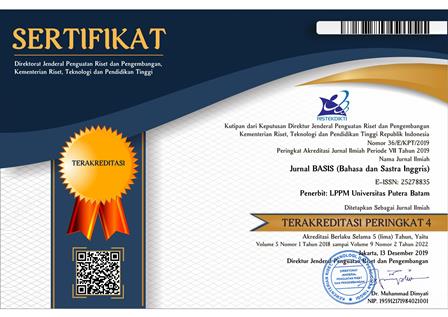HIBRIDITY OF THE CHACRACTERS IN MY SON THE FANATIC STORY BY HANIEF KURESHI
DOI:
https://doi.org/10.33884/basisupb.v6i2.1432Kata Kunci:
hybridity, mimicry, ambivalence, postcolonial constructionAbstrak
This study aimed to reveal the forms of hybridity as a result of the existence of postcolonial cultural contact with the construction of a colonial form. Researchers revealed the hybridity represented by the characters Parvez and Ali in My Son the Fanatic Short Story by Hanief Kureshi. This study used the Postcolonialism approach in the hybridity concept of Homi K Bhabha. According to. Bhabha (1994) Hybridity is a cross between two different cultures in a tangent interaction. In this case, hybridity is not only seen as a fusion of culture but also cultural products placed in social and historical space under postcolonialism which are part of the imposition of colonial power relations. The qualitative descriptive method was used in this study because of its essence in descriptive text analysis in predetermined literary works. The results of this study indicated that there are two forms of hybridity representation in this study. First, the character of mimicry in the sense of ambiguity and contradictory character as a discourse of cultural devotion due to the colonial construction that was formed. Mimicry is represented by the character Parvez in the story. Second, the ambivalence represented by his son named Ali. Ali was aware of the colonial discriminatory against culture so he resisted the construction but on the other hand, he did not know what identity he should hold.
Referensi
Arianto, T., & Ambalegin. (2019). Indoctrination Against Women in “The Lowland” by Jhumpa Lahiri. OKARA: Jurnal Bahasa Dan Sastra, 12(2), 153–166. https://doi.org/http://dx.doi.org/10.19105/ojbs.v12i2.1935.
Bhabha, H. K. (1984). Of Mimicry and Man: The Ambivalence of Colonial Discourse. Discipleship: A Special Issue on Psychoanalysis, 28, 125–133. https://doi.org/10.2307/778467
Bhabha, H. K. (1994). The location of culture. London: Routledge.
Budiawan. (2010). Ambivalensi: Post-Kolonialisme membedah musik sampai agama di Indoensia. Yogyakaarta: Jalasutra.
Day, T., & Foulcher. (2008). Bahasan Kolonial dalam Sastra Indonesia Modern Catatan Pendahuluan. Jakarta: Yayasan Obor Indonesia.
Faruk. (2007). Belenggu Pasca-Kolonial, Hegemoni dan Resistensi dalam Sastra Indonesia. Yogyakaarta: Pustaka Pelajar.
Faruk. (2012). Metode Penelitian Sastra Sebuah Penjelajahan Awal. Yogyakarta: Pustaka Pelajar.
Gilbert, B. M. (1997). Postcolonial Theory: Contexts, Practices, Politics. London: Verso.
Huntington, S. P. (2001). Benturan antar Peradaban. Yogyakaarta: Qalam.
Kureishi, H. (1994). My Son The Fanatic. boston: The New Yorker.
Mashlihatin, A. (2013). Teori pascakolonialisme homi k. bhabha: ontologi dan epistemologinya.
Mishra, V. (2007). The Literature of the Indian Diaspora Theorizing the Diasporic Imaginary. London: Routledge.
Moleong, L. J. (2017). Metodologi Penelitian Kualitatif (37th ed.). Bandung: PT Remaja Rosdakarya.
Ratna, N. K. (2008). Postkolonialisme Indonesia. Yogyakaarta: Pustaka Pelajar.
Rizvi, A. (2015). berjudul Irony, identity and islam: rejection and acceptance in hanif kureishi’s “My Son the Fanatic.” International Journal Of English Language, Literature And Translation Studies (IJELR), 2(3), 214–217. https://doi.org/https://doi.org/10.33329/ijelr
Rokhman, M. A. (2015). British Immigrant’s Father and Son: Psychoanalysing Kureishi’s My Son The Fanatic. Humaniora, 17(2), 204–211. https://doi.org/http://dx.doi.org/10.22146/jh.v17i2.846.
Said, E. (1978). Orientalism. New York: Pantheon.
Spivak, G. C. (1990). Can the Subaltern Speak? Colombia: Columbia University Press.
Young, R. J. C. (1995). Colonial Desire: Hybridity in Theory, Culture and Race. London and New York: Routledge.
##submission.downloads##
Diterbitkan
Terbitan
Bagian
Lisensi

















